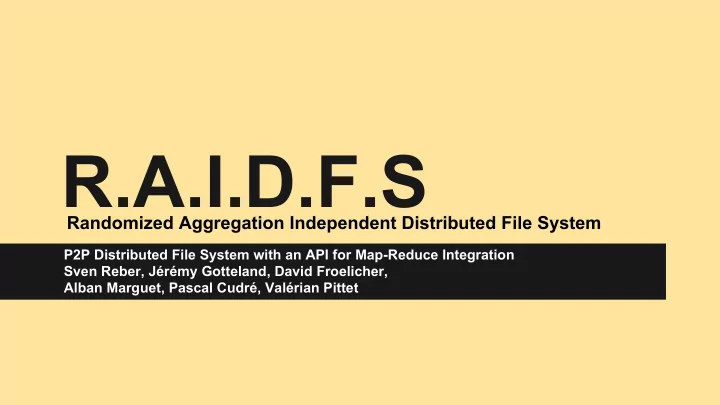

R.A.I.D.F.S Randomized Aggregation Independent Distributed File System P2P Distributed File System with an API for Map-Reduce Integration Sven Reber, Jérémy Gotteland, David Froelicher, Alban Marguet, Pascal Cudré, Valérian Pittet
Context ● clusters hard to configure and expensive to maintain ● everyone has a computer ● lots of unused storage and computational resources on end- user machine ● network connexions are improving
Goals Peer to peer DFS that is ● designed to support Map-Reduce operations ○ chunking by line blocks ○ text files ● resilient ● easy to configure (dynamic configuration) ○ simply connect to the network and run your jobs
Architecture
DFS - Stabilization GlobalChunkField <= 3 (arbitrary) is an unstable state
DFS - Stabilization Look at its neighbors chunkfields
DFS - Stabilization Randomly gets one of the insufficiently replicated chunk
DFS - Stabilization Do not download chunk if it finds enough replicas
DFS - Stabilization File is “stable” when there is enough replicas
DFS - put New file : “put” command
DFS - put publish an index update, then neighbors discover every 20s
DFS - put neighbors try to stabilize file (same process as before)
DFS - put neighbors get missing chunks randomly to complete their GCF
DFS - other commands commands available ● ls ● put ● get ● rm
Map operation ● Some peer starts a Job ● MapFiles (jobid, Resource, Initiator, MapFunction) ○ Each chunk mapped to its result files (can be created in advance) -> One folder for each mapped chunk ○ One key chunk for each key discovered in the original chunk
MapFile
Reduce operation ● Keys discovered during map ● Keys sent to initiator
ReduceFile ● Initiator prepare ReduceFile on DFS
ReduceFile ● Peer that wants to create a ReduceFile chunk download the needed keyChunks
ReduceFile ● Initiator knows that a reduce is finished when ReduceFile is stable on DFS
What’s Next ● Large Scale & Stress Tests of DFS ● Implement the Map and Reduce files ● Include multi-master management (results from the MRp2p paper)
Recommend
More recommend